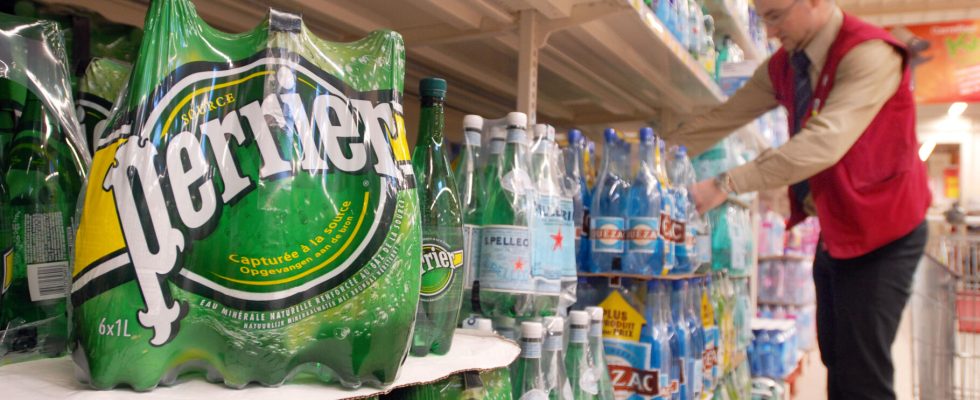JEAN-CHRISTOPHE VERHAEGEN / AFP
The Nestlé Waters scandal highlighted the problem of groundwater pollution.
WATERS – The Nestlé scandal has added water to the gas. In January, The world and Radio France revealed the prohibited treatments and filtering used by four brands of mineral water: Perrier, Vittel, Hépar and Contrex, all belonging to the Swiss giant. Nestlé, faced again this Wednesday, April 24 with contamination of fecal origin in one of its operations, has in fact exceeded regulations, at least until 2021, without the State lifting a finger.
This affair brought to light the very source of the problem: groundwater is increasingly polluted, effectively endangering the future of bottled water. Remember, there are two main types of bottled water sold in supermarkets: “mineral waters which have medicinal properties, drawn from underground deposits which interact with rocks, and spring waters which are sold for their natural purity”, explain to HuffPost Luc Aquilina, hydrogeologist. Both are supposed to be minimally treated, and that’s what makes them different from the water that flows from our taps.
Specific treatments
“Mineral and spring waters are not allowed to have disinfectant treatments or which will eliminate pesticides, unlike tap water. Manufacturers can only use physical treatments to eliminate unstable or undesirable elements that are naturally present in water, such as iron or arsenic.abounds in HuffPost Sophie Besnault, engineer specializing in water treatment at INRAE.
Nestlé should therefore not have marketed waters with the appellation “mineral” Or “from source”, by carrying out specific treatments on drinking tap water. The multinational nevertheless marketed for several years “Bottled water similar to tap water is 100 times more expensive” underlines Luc Aquilina.
If Nestlé has played dangerously with the standards, it is because the firm finds itself in difficulty in marketing its natural waters. drawn from the source, even as scientists note a worsening in the quality of our groundwater.
“Intensified human activities and increasingly difficult weather conditions around our springs may occasionally impact the stability of the essential characteristics of our natural mineral waters in certain boreholes,” admits in this regard Nestlé Waters France, questioned by THE HuffPost. The company also ensures that it has strengthened its controls to “guarantee the safety and quality of [ses] products”.
Fertilizers, pesticides, cow medicines…
Behind the “ human activities ” pollutants ementioned by Nestlé, we find first of all intensive agriculture. “Mineral fertilizers, such as nitrogen and nitrates” and the “organic fertilizers, from animal droppings”, used by farmers to destroy mushrooms or plants, end up in groundwater, deplores Luc Aquilina. Not to mention the rejections of “pesticides, and their degradation products”or residues of drugs given to farm animals.
“We cannot say that we will catch an illness from having drunk Vittel all our life. » Luc Aquilina, hydrogeologist
Added to this are emerging pollutants, “like microplastics”, or even PFAS, continues the professor of environmental sciences at the University of Rennes. Per- and polyfluoroalkylated pollutants, so-called “eternal” for their worrying longevity, have been used since the 1940s by the textile industry, or to manufacture packaging and kitchen utensils. They are now omnipresent in the waters. “ There is also pollution which is due to the runoff of hydrocarbons on the roads, linked to urbanization. adds Sophie Besnault.
Change regulations or stop production of bottled water
This cocktail of molecules in the environment is cause for concern, especially “that it is difficult to quantify the health riskspoints out Luc Aquilina. We know how to analyze the toxicity of a pollutant in isolation, at high doses and over a short period. But we know less well the impact of a pollutant present at low doses over a long period, and even less well known about the danger of the accumulation of molecules present at low doses over the long term. » This last scenario is what we experience in the 21st century: we are invaded by pesticides, without knowing with certainty their consequences on our health.
“Stopping the production of bottled water, in terms of environmental impact, would be the best. » Sophie Besnault, engineer at INRAE
“We cannot say that we will catch an illness from having drunk Vittel all our life, it is more insidious. It is the cumulative effect of pesticides in water, food and air that constitutes a danger. insists the hydrogeologist. And recalls that the problem of groundwater pollution unfortunately goes beyond the problem of manufacturers who only use “ few deposits compared to the total quantity of water withdrawn for French consumption. »
The future is not bottled water
If the concentration of these dangerous pesticides increases in the waters of the bowels of the earth, what will the bottled water industry which cannot treat them do? “Either the regulations would have to be changed to allow treatments, but the public would have to be informed that they are buying water of the same quality as that from the tap. Either stop the production of bottled water, in terms of environmental impact, that would be best,” answers engineer Sophie Besnault.
For Luc Aquilina too, the future is not bottled water. They are more expensive, and “generate greenhouse gases and plastic”, argues the groundwater specialist, who recalls that tap water is “ extremely monitored and of good quality in France, especially in large cities”. The French overseas, however, are not so lucky, tap water being particularly contaminated with chlordecone in Guadeloupe and Martinique.
For its part, Nestlé Waters still believes in its model. The subsidiary of the Swiss giant claims to improve the protection of its sources, thanks to the establishment of a “filtration device combined with a strict bottling circuit cleaning program”. And promises: “The transformation we are carrying out aims to continue to offer future generations mineral waters which are part of the history of our territories and our heritage. » But polluting human activities will perhaps themselves put an end to the French idyll with bottled water.
Also see on HuffPost :

